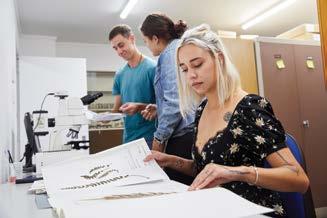
3 minute read
Bachelor of Applied Science (Biodiversity Management
LEVEL 7 BACHELOR OF APPLIED SCIENCE (BIODIVERSITY MANAGEMENT)
Total credits 360 (3.0 EFTS) Campus Mt Albert Start dates February or July Duration Full-time for three years or part-time options available Annual tuition fees $7,300 (NZD) (Approximate domestic fee only)
Career opportunities • Biosecurity analyst or advisor • Conservation manager for DoC or iwi • Ecologist • Park ranger (Council or DoC) • Geographic information systems (GIS) analyst • MPI quarantine officer • Biodiversity analyst or advisor
Highlights • Developed in response to increasing global concerns over the human impact on our natural environment. • Emphasis on practical application: possible work experience in applied settings for organisations like the Ministry for Primary Industries (MPI), Department of Conservation (DOC), the Auckland Council or volunteer organisations. • Complete a research project in an area of your own interest in order to develop the skills you'll need for a career in your chosen field. • One of our biggest strengths is plant identification, a skill well regarded by the conservation industry. We’ll help you develop your knowledge and confidence with plant identification. • A teaching team of highly qualified and respected scientists and industry consultants including botanists and an ornithologist.
In this degree programme, you’ll get your hands dirty straight away, learning about ecosystems, conservation issues, sustainable management of land, animals, and plant life, as well as the management strategies that promote the conservation of biodiversity and address biosecurity.
Programme overview As a biodiversity management student, you’ll explore how ecosystems function and support biological diversity, and how managers of biodiversity are responding to increasing concern over the impact of human activities on the planet.
Find out how society views and influences the natural environment, discover how social, cultural, and policy frameworks influence management decisions, and develop plant identification knowledge and skills.
You’ll also develop an appreciation of the influence that government agencies, non-statutory organisations, and voluntary bodies have on biodiversity and biosecurity.
Double major Can’t decide between animals or the environment? Study a double major and you'll get the best of both worlds, with a selection of animal and environment related courses.
Double majors are highly recommended. They further grow your knowledge and capabilities, and it makes you more employable and competitive in the job market.
Admission requirements For this programme, you’ll need:
Academic
1. 42 credits at NCEA Level 3 or higher including: • 14 credits in two different approved subjects; and • 14 credits from up to two subjects (approved or non-approved)
2. 8 credits at NCEA Level 2 or higher in English or Te Reo Māori (4 in reading, 4 in writing) 3. 14 credits in NCEA Level 1 or higher in
Mathematics or Pāngarau
English
If English is not your first language, you’ll need one of the following:
Achieved NCEA Level 3 and New Zealand University Entrance Provide evidence you satisfy our criteria for existing English proficiency such as IELTS Achieved at least one English proficiency outcome in the last two years
If you don’t meet the English criteria above, we have a range of English Language programmes available (see unitec.ac.nz/ english).
There are additional English requirements for international students – you can find more information on our website.
Other options
If you don’t meet these requirements, you could still apply for special or discretionary admission.
For more information download the programme regulations: unitec.ac.nz/biodiversity
International Students, please visit unitec.ac.nz/international
Apply Now
THE HERBARIUM
With a collection of 11,500 scientifically preserved plants, fungi, lichens and seaweeds, the Herbarium is where you’ll learn about plant specimen collection and preparation techniques.
Lots of important research work happens in the Herbarium including investigations into invasive and native plants and fungi, as well as the studies of an active lichen research group. There’s also the opportunity to volunteer to assist with accessioning and curation.








